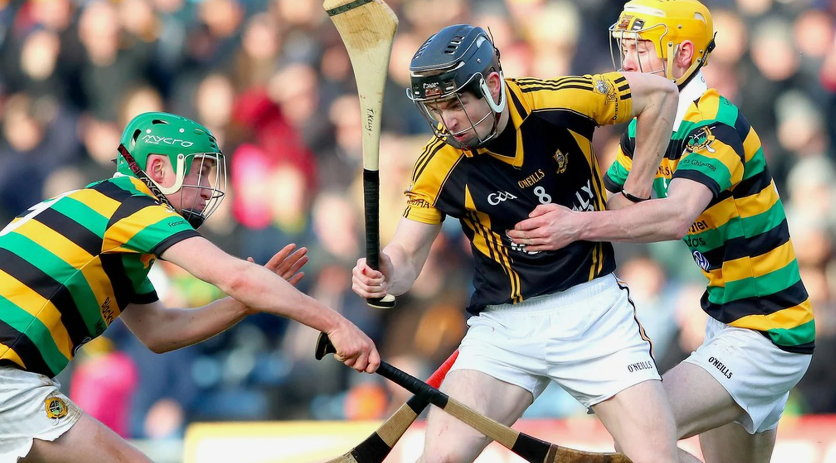The Nicky Rackard Cup, a highly regarded hurling competition in Ireland, honors the renowned Wexford hurler Nicky Rackard. The All-Ireland Senior Hurling Championship comprises four fiercely contested matches. Teams from the Christy Ring Cup, which is one level below the All-Ireland Senior Title, participate in the Lory Meagher Cup as lower divisions. This competition is the ultimate showcase for teams to demonstrate their skills and fight fiercely for the highly coveted championship trophy. This highly acclaimed competition demands teams to exhibit their skills and fiercely compete for the coveted trophies.
History
Back in 2003, the Hurling Development Committee (HDC) faced serious allegations of attempting to completely overhaul the hurling championship. The board comprised executives from various counties, including Pat Dunny from Kildare, Liam Griffin from Wexford, P.J. O’Grady from Limerick, Jimmy O’Reilly from Down, and Willie Ring from Cork.
After conducting extensive discussions with chiefs, players, and authorities over 90 days, and seeking valuable inputs from the Gaelic Players Association. A proposal has been put forward to effectively restructure the hurling championship into three distinct levels. This proposal takes inspiration from the successful 2004 National Hurling League format. This format is aimed at bringing about a positive change in the championship.

There were 12 teams in the top tier, while the remaining 20 competed in the Nicky Rackard Cups. There would also be promotion delegation tournaments between the 3 championship levels. At the 2005 GAA Congress, it unequivocally decided that the HDC would schedule these games as curtain-raisers to the All-Ireland quarter-finals and semi-finals. On December 8, 2004, Croke Park confidently launched the Christy Ring Cup and Nicky Rackard Cup rivalries.
Origins and Heritage
The Nicky Rackard Cup is a befitting tribute to one of the most renowned hurlers of Wexford and his remarkable legacy. His unwavering passion, unparalleled expertise, and unmatched commitment to the game have left an indelible imprint, undoubtedly inspiring countless generations of players.
The Nicky Rackard Cup was founded to support the growth of the All-Ireland Senior Hurling Championship. With hurling’s widespread popularity across Ireland, it became imperative to establish a comprehensive structure that could accommodate teams of all levels of ability. The Nicky Rackard Cup is the ultimate platform for teams to showcase their talent and compete at the highest level of national championship. With its tiered format, the Cup is an absolute necessity for any team looking to make a mark in the world of competitive sports.
Structure and Format
The Nicky Rackard Cup has been meticulously designed to promote fierce and competitive matchups while advocating strongly for the advancement of hurling proficiency across diverse regions. The participating teams are composed of those from the Christy Ring Cup, which represents the tier directly beneath the All-Ireland Senior Hurling Championship, as well as carefully selected teams from lower divisions.
The path to the prestigious Cup is only for those who are willing to fight fiercely on the hurling field. Groups must compete with unwavering determination and a potent blend of expertise to claim victory.
2005-2006
The twelve teams were decisively split into three groups of four, with each group fiercely and competitively engaging in a round-robin format. In this tournament, every team had the opportunity to play at least three games, proving their mettle on the field and demonstrating their skills. The formidable champions in each group exhibited their exceptional skills and resources, dominating their opponents with ease and emerging triumphant in the semi-finals of the competition.
The organizers divided the tournament into three groups, labeling them as 3A, 3B, and 3C. The champion of group 3A shall confront the victor of a clash between the runners-up in groups 3B and 3C, determined to emerge as the ultimate winner of this fierce competition. The victor of the competition secured their place in the semi-finals, alongside the three former champions.
2007-2008
The organizing committee divided the twelve participating teams into four groups of three and implemented a round-robin format, restricting each team to only two games. Only the top-performing teams and participants from each group have made it to the quarter-finals of the competition.
2009-2017
In 2009, the implementation of a double-elimination arrangement ensured that every team played a minimum of two games before elimination. With unwavering determination, the eight teams fiercely battled it out in four Round 1 matches.
- It’s worth emphasizing that the Round 1 champions have advanced to Round 2A with unwavering confidence.
- The losers (flops) in Round 1 go into Round 2B.
- There are two Round 2A matches.
- It’s important to note that only the victors of Round 2A will move on to the semi-finals. No exceptions.
- The losers (flops) in Round 2A set out into the quarter-finals.
- There are two Round 2B matches.
- The victors in Round 2B residential to the quarter-finals.
- The failures encountered during Round 2B must be accounted for and addressed before the transmission season comes to a close.
- The underperforming teams from the previous season will be demoted to compete in the Lory Meagher Cup in the upcoming year.
- The teams that lost in Round 2A will play two matches against the winners of Round 2B.
- The champs of the quarter-finals advance to the semi-finals.
- We eliminate the failures of the quarter-finals.
- The semi-final matches will feature the winners of Round 2A against the victors of the quarter-finals.
- The champions of the semi-finals advance to the last.
- The competition dismisses the semi-final failures.
The winners of last year’s Nicky Rackard Cup take home promotion to the Christy Ring Cup for the coming year.
2018-Present
In 2018, the Nicky Rackard Cup underwent a redesign, with a more organized approach to the preliminary matches. The new format featured four groups of three teams each, ensuring a fairer and more competitive environment. Beforehand it was a twofold end competition. “The two leading teams from each group will unquestionably progress to the semi-finals of the cup.” Each group’s top performers will move on to a final round.
The Nicky Rackard Cup victor will move up to the Christy Ring Cup. Two teams will move up to the 2019 Nicky Rackard Cup as a result of their participation in the 2018 Christy Ring Cup. To ensure that the 2019 edition comprises eight teams divided into two groups of four.
While it’s unfortunate, the team at the bottom of the table has an opportunity to improve their position to avoid relegation to the Lory Meagher Cup. It is imperative to note that the winner of the previous year’s competition will assert their place over others.
Significance and Prestige
Competing in the Nicky Rackard Cup is a golden opportunity to make your mark in hurling history and pave the way for a victorious win. Players showcase their talents on the Cup stage, facing tough opponents.
Besides, the Nicky Rackard Cup encapsulates the comprehensive soul of hurling, embracing groups from all edges of Ireland and giving a gathering to more modest regions to gleam on a public stage. It praises the diversity of the hurling community, showcasing the unique styles and customs that define each participating region.
Impact and Legacy
The Nicky Rackard Cup is a highly significant tradition, extending far beyond the boundaries of the hurling field and impacting players, mentors, and allies alike. It represents their shared desires and aspirations. The statement in question is a fundamental source of inspiration for developing talent, for future accomplishment. Moreover imbuing a profound sense of gratification in representing one’s respective domain on a national platform.
Winning the Cup not only cultivates a sense of community and camaraderie among hurling enthusiasts but also transcends generational limits. It unites people through festivals and empowers local communities by providing them with much-needed support.
Conclusion
The Nicky Rackard Cup is a testament to the enduring tradition and indomitable spirit of Irish hurling players. The Cup has rightfully earned its place as a highly esteemed and prestigious competition, having come a long way from its humble origins. The essence of the game lies in its recognition of skill, fair play, and the relentless pursuit of excellence. As players take to the field in the quest for triumph, they convey with them the deepest desires of previous eras, guaranteeing that the tradition of Nicky Rackard and the spirit of hurling endure for many years to come.
